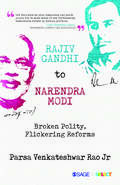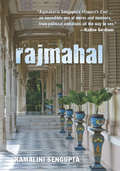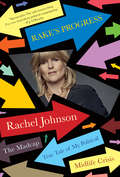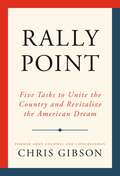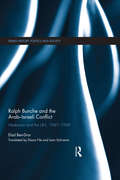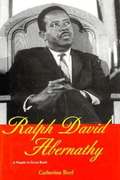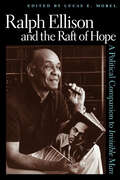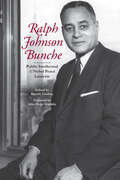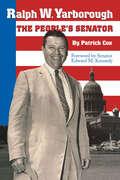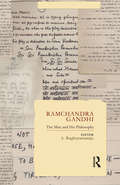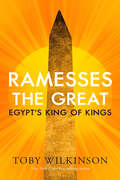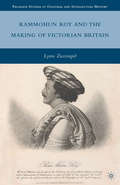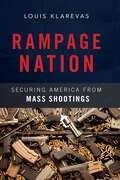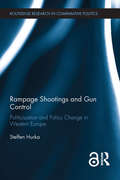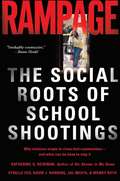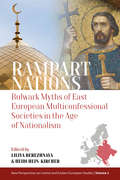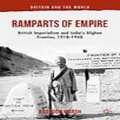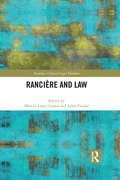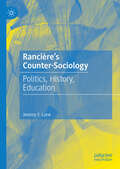- Table View
- List View
Rajiv Gandhi to Narendra Modi: Broken Polity, Flickering Reforms
by Parsa Venkateshwar Rao JrFor the first time, the political story of India from the mid-1980s to the second decade of the present century is reconstructed through the first-person narratives of political leaders, revealing their inmost thoughts in their public utterances, offering weak arguments for their unforgivable lapses, speaking in eloquent terms of their achievements and sometimes showing uncharacteristic humility in what they said in their public speeches, in the Lok Sabha, in their blogs. From Rajiv Gandhi’s confession about how and why he came into politics, Narendra Modi’s graphic description of his inner agony during the Gujarat riots, Vajpayee’s disarming confession about Nehru, Narasimha Rao’s stoic stance in a letter to his childhood friend, Advani’s confessions in the Lok Sabha about why television was pressed into service during the Kargil War, what emerges is a historical drama of Shakespearean range and an intensity which is more than what brilliant historians and acute political analysts can hope to achieve. The book shows that the first draft of history is found in the words of politicians in parliament and in the government. It captures the immediacy of history-in-the-making, and the palest platitudes of politicians that acquire rare poignancy.
Rajkiya Siddhant Ani Adhunik Bhartiya Rajkiya Vichar First Semester FYBA New NEP Syllabus - RTMNU: राजकीय सिद्धांत आणि आधुनिक भारतीय राजकीय विचार पहिले सत्र एफ.वाय.बी.ए. नवीन एन.इ.पी. अभ्यासक्रम - राष्ट्रसंत तुकडोजी महाराज नागपूर विद्यापीठ
by Prof. Shaikh Hasham Dr Jogendra V. Gawai"राजकीय सिद्धांत आणि आधुनिक भारतीय राजकीय विचार" हे पुस्तक बी.ए. प्रथम वर्ष, सेमेस्टर १ च्या विद्यार्थ्यांसाठी तयार करण्यात आलेले असून, राष्ट्रसंत तुकडोजी महाराज नागपूर विद्यापीठाच्या अभ्यासक्रमानुसार आहे. यात राजकीय सिद्धांत, राज्य, सत्ता, अधिसत्ता, स्वातंत्र्य, समता, हक्क आणि न्याय यांचे सखोल विश्लेषण करण्यात आले आहे. आधुनिक भारतीय राजकीय विचारांमध्ये महात्मा गांधींचे सत्याग्रह, अहिंसा आणि ट्रस्टीशिपचे सिद्धांत तसेच डॉ. बाबासाहेब आंबेडकरांचे जातिव्यवस्था, राज्य समाजवाद आणि संसदीय लोकशाहीवरील विचार यांचा अभ्यास समाविष्ट आहे. परीक्षेसाठी उपयुक्त ठरणाऱ्या या पुस्तकात दीर्घोत्तरी, लघुत्तरी आणि वस्तुनिष्ठ प्रश्नांचा समावेश असून, हे विद्यार्थी आणि अभ्यासकांसाठी मार्गदर्शक ठरते.
Rajkiya Vruttankan-1 First Semester FYBA New NEP Syllabus - RTMNU: राजकीय वृत्तांकन-१ पहिले सत्र एफ.वाय.बी.ए. नवीन एन.इ.पी. अभ्यासक्रम - राष्ट्रसंत तुकडोजी महाराज नागपूर विद्यापीठ
by Prof. Dr. Pravin Shriram Bhagdikar‘राजकीय वृत्तांकन-१’ या पुस्तकात राजकीय वार्तांकन म्हणजे काय, त्याची व्याप्ती, स्वरूप आणि महत्त्व काय आहे याची माहिती दिली आहे. राजकीय बातमी कशी तयार करायची, त्यासाठी कोणती कौशल्ये आवश्यक आहेत आणि एका राजकीय पत्रकाराची जबाबदारी काय असते, याची माहिती यात आहे. या पुस्तकात पत्रकारितेतील नैतिक मूल्ये, नियम आणि कायदे यांवर जोर देण्यात आला आहे. तसेच, संसद आणि न्यायपालिका यांसारख्या विविध राजकीय संस्थांचे वार्तांकन कसे करायचे, याची माहिती दिली आहे. पुस्तकात वृत्तपत्रांचे स्वातंत्र्य, जबाबदारी आणि लोकशाहीमध्ये माध्यमे काय भूमिका निभावतात, याची माहिती दिली आहे.
Rajkiya Vruttankan-2 Second Semester FYBA New NEP Syllabus - RTMNU: राजकीय वृत्तांकन-२ दुसरे सत्र एफ.वाय.बी.ए. नवीन एन.इ.पी. अभ्यासक्रम - राष्ट्रसंत तुकडोजी महाराज नागपूर विद्यापीठ
by Prof. Dr. Pravin Shriram Bhagdikar‘राजकीय वृत्तांकन-२’ या पुस्तकात राजकीय पत्रकारितेच्या तत्त्वांवर प्रकाश टाकते आणि राजकीय वृत्तांकन करताना आवश्यक असलेल्या प्रक्रियांवर भर देते. यात अंदाजपत्रक, संसदीय कामकाज, राजकीय सभा, नेत्यांच्या भेटी, मुलाखती आणि निवडणूक प्रचारासारख्या घटनांचे वृत्तांकन कसे करावे याचे मार्गदर्शन दिले आहे. माहिती संकलन, प्रत्यक्ष भेट, साक्षीदारांची मुलाखत, तथ्य तपासणी आणि वृत्त अहवालाचा मांडणीबाबत सविस्तर चर्चा करण्यात आली आहे. राजकीय वृत्तांकन करताना वस्तुनिष्ठता, जबाबदारी आणि पारदर्शकता कशी राखावी यावर भर दिला आहे. रेडिओ, टीव्ही आणि प्रिंट माध्यमांमध्ये राजकीय बातम्या संकलित करताना कोणत्या आव्हानांचा सामना करावा लागतो आणि योग्य अहवाल तयार करण्यासाठी कोणत्या रणनीती आवश्यक आहेत याचे विश्लेषणही पुस्तकात केले आहे. निवडणूक वार्तांकन आणि प्रसारमाध्यमांच्या जबाबदारीवर विशेष भर दिला आहे.
Rajmahal
by Kamalini SenguptaAn exploration of post-colonial Indian life through &“engagingly embroidered stories that leave us replete and delighted&” (The Sunday Tribune, India). Marriages, affairs, death, madness, and second chances all live within the walls of Rajmahal, an unusual Bengali house that has stood through a century of turbulent changes. Within the walls of this stately home, now divided into six apartments, the melting pot of tenants include Sikhs, Muslims, Brits, Russian-Bengalis, zamindari Bengalis, and Roman Catholics. As different as they are, all face the same struggle to come to grips with the social, economic, and intellectual forces working in India as it moves from the British Raj to independence. In this beautifully crafted tale, the intertwined fortunes and personal battles of these characters become a mirror of the country&’s struggle for possession of its future. &“The encompassing achievement of the novel is its penetration . . . of the life of the post-colonialist and post-colonized living on, somehow together&” (Nadine Gordimer, winner of the Nobel Prize in Literature).
Rajyashastracha Parichay-1 First Semester FYBA New NEP Syllabus - SPPU: राज्यशास्त्राचा परिचय-१ प्रथम सत्र एफ.वाय.बी.ए. नवीन एन.इ.पी. अभ्यासक्रम - सावित्रीबाई फुले पुणे यूनिवर्सिटी
by Dr Prajakta Balwantarao Thubeसावित्रीबाई फुले पुणे विद्यापीठाच्या (SPPU) नवीन राष्ट्रीय शैक्षणिक धोरण (NEP) 2020 अंतर्गत ‘राज्यशास्त्राचा परिचय-1’ हा प्रथम वर्ष बी.ए. (FYBA) अभ्यासक्रम समाविष्ट आहे. या अभ्यासक्रमाचा उद्देश विद्यार्थ्यांना राज्यशास्त्राची व्याख्या, स्वरूप, व्याप्ती आणि पारंपरिक व आधुनिक दृष्टिकोनांचा परिचय करून देणे हा आहे. राज्य, शासनसंस्था, कायदे आणि राजकीय सिद्धांतांचे सखोल ज्ञान प्रदान करून विद्यार्थ्यांना स्पर्धा परीक्षांसाठी तयार करणे आणि त्यांचे राजकीय विज्ञानाविषयीचे ज्ञान वृद्धिंगत करणे हे त्याचे प्रमुख हेतू आहेत. अभ्यासक्रमामध्ये राज्यशास्त्राची व्याप्ती, राज्याचा विकास, आणि राज्याच्या घटकांचा सविस्तर अभ्यास समाविष्ट आहे.
Rajyashastrachi Olakh-2 Second Semester FYBA New NEP Syllabus - SPPU: राज्यशास्त्राची ओळख-२ दुसरे सत्र एफ.वाय.बी.ए. नवीन एन.इ.पी. अभ्यासक्रम - सावित्रीबाई फुले पुणे यूनिवर्सिटी
by Dr Pramod Rajendra Tambe Prof. R. D. Varadkar‘राज्यशास्त्राची ओळख-2’ हे पुस्तक राज्यशास्त्राच्या विविध संकल्पना आणि त्यांच्या उपयोजनांवर आधारित आहे. यामध्ये राज्य, सार्वभौमत्व, लोकशाही, अधिकार व कर्तव्ये, शासनप्रणाली, आणि संविधान यांसारख्या मूलभूत विषयांवर सखोल चर्चा करण्यात आली आहे. भारतीय राज्य घटनेतील महत्त्वाचे मुद्दे, केंद्र-राज्य संबंध, न्यायपालिका आणि विधिमंडळ यांचे कार्य व महत्त्व स्पष्ट केले आहे. याशिवाय, राज्यशास्त्रातील विचारवंतांचे सिद्धांत, जागतिक राजकारणातील बदल, आंतरराष्ट्रीय संबंध आणि राजकीय विचारधारेचे महत्त्व अधोरेखित केले आहे. विद्यार्थ्यांसाठी अभ्यासक्रमाला पूरक ठरतील अशा प्रश्नोत्तरांच्या स्वरूपात माहिती दिलेली आहे. पुस्तकात सादर केलेल्या आकृत्या आणि तक्त्यांद्वारे विषय सुलभ व समजण्यास सोपा करण्यात आला आहे. भारतीय लोकशाहीची वैशिष्ट्ये आणि आंतरराष्ट्रीय राजकीय घटनांचे महत्त्व समजण्यासाठी हे पुस्तक उपयुक्त ठरते.
Rake's Progress: The Madcap True Tale of My Political Midlife Crisis
by Rachel JohnsonThe madcap true story of how Rachel Johnson—born into one of Britain's most famous political families and known since childhood as "Rake"—tries and fails to get elected in the 2019 hard-fought effort to stop Brexit, running against her older brother, Boris, and what she learns in the process about politics, ambition, family, marriage, and winning and losing.In this fast-paced, irresistible tale, part comic memoir, part diary, part manifesto, Rachel Johnson, daughter of one of England's most brilliant and idiosyncratic families, tells the story of how, in a fit of righteous fury about how the 2019 Brexit vote to leave the EU would affect her own children in their freedom to live, learn, travel, and love, brought about by men she has known either since school or birth, she decides to become the lead candidate for the newly organized pro-Europe Change UK party, running against her older brother, Alexander, known to the world as Boris, who as a child of six claimed he wanted to be "World King"; with Rachel, a year younger, wanting to be "wife and mother." Johnson writes how she set out to attain the slight victory needed to win her district, crisscrossing its 28,000 square miles on trains, speaking at rallies, handing out leaflets to retirees in freezing supermarket parking lots . . . She writes of the betrayals, the egos, the broken promises, the tensions, the pulls and pushes of campaigning. And she writes of what it is to be a candidate, and female and a mother, of the challenges faced by women in public life, and the reality that for women in the UK, despite having had two female prime ministers, not that much has changed . . . and in the midst of it all, she tells the riveting story of the Johnson family itself, as curious, recognizable and compelling as the Mitfords of England; as famous and lionized as the Kennedys in the U.S. . . .
Rally Point: Five Tasks to Unite the Country and Revitalize the American Dream
by Chris GibsonA smart and surprising political inventory for how America can reunite and revitalize in a time of crisis.Written by an admired leader of the Republican party, RALLY POINT: Five Tasks to Unite the Country and Revitalize the American Dream looks past the 2016 election, past the finger pointing and conventional political thinking, to focus on clear, primary principles that conservatives must debate and defend to protect the future of America.Raised in a working-class family in upstate New York, the first in his family to go to college, paid for in part by his service in the National Guard, Chris Gibson rose from Private to Colonel in the Army, including combat command in the storied 82nd Airborne Division. RALLY POINT is his story: what he's learned from the "School of Hard Knocks" and how he's applied those precious life lessons during his service in Iraq and in Congress.Drawn from a deep appreciation of history and American exceptionalism, Gibson provides incisive and frank analysis of the current political environment, including President Trump, and provides a roadmap based on time-tested Founding principles to help unite our country and revitalize the American Dream. RALLY POINT is a thoughtful, compelling, enjoyable read - a must for serious-minded Americans looking for answers in this challenging political environment.
Ralph Bunche and the Arab-Israeli Conflict: Mediation and the UN, 1947-1949 (Israeli History, Politics and Society)
by Elad Ben-Dror"I swear by all that’s Holy, I will never come anywhere near the Palestine problem once I liberate myself from this trap." Ralph Bunche wrote these lines to his wife in 1949, during the armistice talks on Rhodes. A year later, he was awarded the Nobel Peace Prize for his success in ending the 1948 Arab-Israeli war. Ralph Bunche and the Arab-Israeli Conflict provides a comprehensive study of Ralph Bunche’s diplomatic activities on the Palestine question. Bunche was at the centre of the story from the referral of the issue to the United Nations in 1947 until the signing of the armistice agreements that ended the war. He began as advisor to UNSCOP and then headed the secretariat of the commission tasked with implementing partition. Later, after serving as the senior aide to UN mediator Folke Bernadotte, he was appointed to replace the Count after the latter’s assassination. Using extensive archival materials (some of it revealed here for the first time), this book addresses central questions, such as the relationship between Bunche’s African American identity and his diplomatic endeavours, and the complexities of his outlook on the Arab-Israeli conflict. Through research and careful analysis, it uncovers how Ralph Bunche managed to bridge the gaps between Israel and Arab states. This book will be of interest to students and scholars of Middle Eastern History, particularly Israeli History, as well as Political Science and Diplomacy.
Ralph David Abernathy
by Catherine ReefA biography of Martin Luther King's second in command in the civil rights movement, including Abernathy's role after King's untimely death.
Ralph Ellison and the Raft of Hope: A Political Companion to Invisible Man
by Lucas E. Morel“This superb [essay] collection enables readers of Invisible Man to appreciate the subtleties of its cultural and political commentary.” —Journal of American StudiesAn important collection of original essays that examine how Ellison’s landmark novel, Invisible Man (1952), addresses the social, cultural, political, economic, and racial contradictions of America. Commenting on the significance of Mark Twain’s writings, Ralph Ellison wrote that “a novel could be fashioned as a raft of hope, perception and entertainment that might help keep us afloat as we tried to negotiate the snags and whirlpools that mark our nation’s vacillating course toward and away from the democratic ideal.” Ellison believed it was the contradiction between America’s “noble ideals and the actualities of our conduct” that inspired the most profound literature?”the American novel at its best.”Drawing from the fields of literature, politics, law, and history, the contributors make visible the political and ethical terms of Invisible Man , while also illuminating Ellison’s understanding of democracy and art. Ralph Ellison and the Raft of Hope uniquely demonstrates why Invisible Man stands as a premier literary meditation on American democracy.“Essential reading for anyone interested in understanding Ellison’s political thought.” —Lawrence Jackson, author of Ralph Ellison: Emergence of Genius“Outstanding. . . . Provides an interdisciplinary perspective of the politics of the book.” —Lexington Herald-Leader“These essays . . . demonstrate that a great work of art has the capacity to renew itself across generations.” —Pamela K. Jensen, Kenyon College“This careful study of Ellison’s great novel is highly recommended for all serious students of American and African American literature.” —African American Review
Ralph Johnson Bunche: Public Intellectual and Nobel Peace Laureate
by John Hope Franklin Jonathan Scott Holloway Charles P. Henry Ben Keppel Lorenzo DuBois Baber Beverly Lindsay Princeton Lyman Edwin Smith Hanes Walton Jr.Nobel Peace Prize winner Ralph Johnson Bunche (1904-71) was one of the twentieth century’s foremost diplomats and intellectuals. In the wake of centennial celebrations of his birth, leading scholars and diplomats assess Bunche’s historical importance and enduring impact on higher education, public policy, and international politics. Their essays reveal not only the breadth of Bunche’s influence, such as his United Nations work to broker peace during times of civil war in Africa, the Middle East, and Asia, but also the depth of his intellectual perspectives on race, civil rights, higher education, and international law. Probing his publications, speeches, and public policy initiatives, the volume offers telling insights into the critical roles of universities, public intellectuals, and diplomats in working together to find solutions to domestic and international problems through public and scholarly engagement. In this way, the volume highlights the very connections that Bunche exhibited as an academic, intellectual, and diplomat. Contributors include Lorenzo DuBois Baber, John Hope Franklin, Jonathan Scott Holloway, Charles P. Henry, Ben Keppel, Beverly Lindsay, Princeton Lyman, Edwin Smith, and Hanes Walton Jr.
Ralph W. Yarborough, The People's Senator (Focus on American History Series)
by Patrick CoxRevered by many Texans and other Americans as "the People's Senator," Ralph Webster Yarborough (19031996) fought for "the little people" in a political career that places him in the ranks of the most influential leaders in Texas history. The only U. S. Senator representing a former Confederate state to vote for every significant piece of modern civil rights legislation, Yarborough became a cornerstone of Lyndon Johnson's Great Society programs in the areas of education, environmental preservation, and health care. In doing so, he played a major role in the social and economic modernisation of Texas and the American South. He often defied conventional political wisdom with his stands against powerful political interests and with his vocal opposition to the Vietnam War. To this day, his admirers speak of Yarborough as an inspiration for public service and a model of political independence and integrity. This biography offers the first in-depth look at the life and career of Ralph Yarborough. Patrick L. Cox draws on Yarborough's personal and professional papers, as well as on extensive interviews with the Senator and his associates, to follow Yarborough from his formative years in East Texas through his legal and judicial career in the 1930s, decorated military service in World War II, unsuccessful campaigns for Texas governor in the 1950s, distinguished tenure in the United States Senate from 1957 to 1970, and return to legal practice through the 1980s. Although Yarborough's liberal politics set him at odds with most of the Texas power brokers of his time, including Lyndon Johnson, his accomplishments have become part of the national fabric. Medicare recipients, beneficiaries of the Cold War G. I. Bill, and even beachcombers on Padre Island National Seashore all share in the lasting legacy of Senator Ralph Yarborough. Patrick L. Cox is a historian at the Centre for American History at the University of Texas at Austin.
Ramchandra Gandhi: The Man and His Philosophy
by A. RaghuramarajuRamchandra Gandhi, famous for his rich and varied interests, left behind a large corpus of writings, both philosophical and non-philosophical. Introducing the readers to the creative Indian philosopher, this volume highlights the principal thrust of his works, critically locates them within the larger political, philosophical, literary and socio-cultural context, and accounts for his lasting influence. For the first time, essays on Ramchandra Gandhi’s earlier works and later writings have been brought together to take stock of his contribution to contemporary Indian thought as a whole. Written by philosophers as well as those belonging to literature and the social sciences, the essays record his experimental ventures both in form and content, and shed light on key themes in language, communication, religion, aesthetics, spirituality, consciousness, self, knowledge, politics, ethics, and non-violence. The book will appeal to those in philosophy, political science, history, sociology, literature, and Gandhian studies.
Ramesses the Great: Egypt's King of Kings (Ancient Lives)
by Toby WilkinsonThe life, dramatic reign, and enduring legacy of the pharaoh Ramesses the Great, with lessons for the present, from internationally acclaimed Egyptologist Toby Wilkinson Ramesses II ruled the Nile Valley and the wider Egyptian empire from 1279 to 1213 B.C., one of the longest reigns in pharaonic history. He was a cultural innovator, a relentless self-promoter, and an astute diplomat—the peace treaty signed after the Battle of Kadesh was the first in recorded history. He outbuilt every other Egyptian pharaoh, leaving behind the temples of Abu Simbel; the great hypostyle hall of Karnak; the tomb for his wife Nefertari; and his own memorial, the Ramesseum. His reputation eclipsed that of all other pharaohs as well: he was decried in the Bible as a despot, famed in literature as Ozymandias, and lauded by early antiquarians as the Younger Memnon. His rule coincided with the peak of ancient Egypt&’s power and prosperity, the New Kingdom (1539–1069 B.C.). In this authoritative biography, Toby Wilkinson considers Ramesses&’ preoccupations and preferences, uncovering the methods and motivations of a megalomaniac ruler, with lessons for our own time.
Rammohun Roy and the Making of Victorian Britain
by Lynn ZastoupilThis book investigates Rammohun Roy as a transnational celebrity. It examines the role of religious heterodoxy - particularly Christian Unitarianism - in transforming a colonial outsider into an imagined member of the emerging Victorian social order It uses his fame to shed fresh light on nineteenth-century British reformers, including advocates of liberty of the press, early feminists, free trade imperialists, and constitutional reformers such as Jeremy Bentham. Rammohun Roy's intellectual agendas are also interrogated, particularly how he employed Unitarianism and the British satiric tradition to undermine colonial rule in Bengal and provincialize England as a laggard nation in the progress towards rational religion and political liberty.
Rampage Nation: Securing America from Mass Shootings
by Louis KlarevasIn the past decade, no individual act of violence has killed more people in the United States than the mass shooting. This well-researched, forcefully argued book answers some of the most pressing questions facing our society: Why do people go on killing sprees? Are gun-free zones magnets for deadly rampages? What can we do to curb the carnage of this disturbing form of firearm violence? Contrary to conventional wisdom, the author shows that gun possession often prods aggrieved, mentally unstable individuals to go on shooting sprees; these attacks largely occur in places where guns are not prohibited by law; and sensible gun-control measures like the federal Assault Weapons Ban-which helped drastically reduce rampage violence when it was in effect-are instrumental to keeping Americans safe from mass shootings in the future. To stem gun massacres, the author proposes several original policy prescriptions, ranging from the enactment of sensible firearm safety reforms to an overhaul of how the justice system investigates potential active-shooter threats and prosecutes violent crimes. Calling attention to the growing problem of mass shootings,Rampage Nationdemonstrates that this unique form of gun violence is more than just a criminal justice offense or public health scourge. It is a threat to American security.
Rampage Shootings and Gun Control: Politicization and Policy Change in Western Europe (Routledge Research in Comparative Politics)
by Steffen HurkaWhile the causes of rampage violence have been analysed thoroughly in diverse academic disciplines, we hardly know anything about the factors that affect their consequences for public policy. This book addresses rampage shootings in Western Europe and their conditional impact on politicization and policy change in the area of gun control. The author sets out to unravel the factors that facilitate or impede the access of gun control to the political agenda in the wake of rampage shootings and analyses why some political debates lead to profound shifts of the policy status quo, while others peter out without any legislative reactions. In so doing, the book not only contributes to the theoretical literature on crisis-induced policy making, but also provides a wealth of case-study evidence on rampage shootings as empirical phenomena. In particular, the extent to which gun control gets politicized as a policy failure can either result from a bottom-up process (event severity and media pressure) or from a top-down logic (issue ownership and the electoral cycle). Including 12 case studies on the rampage shootings which have triggered a debate over the appropriateness of the affected countries´ gun policies, it illustrates that the way political processes unfold after rampage shootings depends strongly on specific causal configurations and draws comparisons between the cases covered in the book and the way rampage shootings are typically dealt with in the United States. This text will be of key interest to scholars and students of public policy, policy analysis, European Politics and more broadly to comparative politics, criminology, psychology, and sociology. The Open Access version of this book, available at https://doi.org/10.4324/9781315209425, has been made available under a Creative Commons Attribution-Non Commercial-No Derivatives 4.0 license.
Rampage: The Social Roots of School Shootings
by David Harding Katherine S. Newman Cybelle Fox Wendy Roth Jal MehtaIn the last decade, school shootings have decimated communities and terrified parents, teachers, and children in even the most "family friendly” American towns and suburbs. <P><P> These tragedies appear to be the spontaneous acts of disconnected teens, but this important book argues that the roots of violence are deeply entwined in the communities themselves. <P>Rampage challenges the "loner theory” of school violence and shows why so many adults and students miss the warning signs that could prevent it.
Rampart Nations: Bulwark Myths of East European Multiconfessional Societies in the Age of Nationalism (New Perspectives on Central and Eastern European Studies #1)
by Liliya Berezhnaya Heidi Hein-KircherThe “bulwark” or antemurale myth—whereby a region is imagined as a defensive barrier against a dangerous Other—has been a persistent strand in the development of Eastern European nationalisms. While historical studies of the topic have typically focused on clashes and overlaps between sociocultural and religious formations, Rampart Nations delves deeper to uncover the mutual transfers and multi-sided national and interconfessional conflicts that helped to spread bulwark myths through Europe’s eastern periphery over several centuries. Ranging from art history to theology to political science, this volume offers new ways of understanding the political, social, and religious forces that continue to shape identity in Eastern Europe.
Ramparts of Empire
by Brandon MarshFor generations of British soldiers and administrators, India's North-West Frontier with Afghanistan constituted an imperial obsession. A combination of fears about the local Pashtun population and external invasion from Afghanistan and Russia convinced the rulers of British India that the region was the one place in the empire where Britain could suffer a 'knock-out blow. ' In this cultural and political study, Brandon Marsh examines the power and infl uence of this belief on the Afghan frontier, India as a whole, and British imperialism between 1918 and 1948. This book explores British attempts to isolate the frontier after the First World War, the relationship between colonial nationalism and state sanctioned violence in the region, and the significant connection between British perceptions about the Afghan frontier and the collapse of the British Raj in India.
Rancher, Farmer, Fisherman: Conservation Heroes of the American Heartland
by Miriam HornThe story of a huge, largely hidden, and entirely unexpected conservation movement in America. Many of the men and women doing today's most consequential environmental work--restoring America's grasslands, wildlife, soil, rivers, wetlands, and oceans--would not call themselves environmentalists; they would be too uneasy with the connotations of that word. What drives them is their deep love of the land: the iconic terrain where explorers and cowboys, pioneers and riverboat captains forged the American identity. They feel a moral responsibility to preserve this heritage and natural wealth, to ensure that their families and communities will continue to thrive. Unfolding as a journey down the Mississippi River, Rancher, Farmer, Fisherman tells the stories of five representatives of this stewardship movement: a Montana rancher, a Kansas farmer, a Mississippi riverman, a Louisiana shrimper, and a Gulf fisherman. In exploring their work and family histories and the essential geographies they protect, Rancher, Farmer, Fisherman challenges pervasive and powerful myths about American and environmental values.
Ranciere and Law (Nomikoi: Critical Legal Thinkers)
by Monica Lopez Lerma Julen EtxabeThis book is the first to approach Jacques Rancière’s work from a legal perspective. A former student of Louis Althusser, Rancière is one of the most important contemporary French philosophers of recent decades: offering an original and path-breaking way to think politics, democracy and aesthetics. Rancière’s work has received wide and increasing critical attention, but no study exists so far that reflects on the wider implications of Rancière for law and for socio-legal studies. Although Rancière does not pay much specific attention to law—and there is a strong temptation to identify law with what he terms the "police order"—much of Rancière’s historical work highlights the creative potential of law and legal language, with important legal implications and ramifications. So, rather than excavate the Rancièrean corpus for isolated statements about the law, this volume reverses such a method and asks: what would a Rancière-inspired legal theory look like? Bringing together specialists and scholars in different areas of law, critical theory and philosophy, this rethinking of law and socio-legal studies through Rancière provides an original and important engagement with a range of contemporary legal topics, including constituent power and democracy, legal subjectivity, human rights, practices of adjudication, refugees, the nomos of modernity, and the sensory configurations of law. It will, then, be of considerable interest to those working in these areas.
Rancière's Counter-Sociology: Politics, History, Education
by Jeremy F. LaneJacques Rancière is almost unique amongst contemporary thinkers in his consistent hostility to sociologically informed modes of interpretation. This hostility is not limited to his detailed critiques of Pierre Bourdieu—it characterises his thinking about politics, emancipation, democracy, history, aesthetics, and social class; it extends into a rejection of Marxist or marxisant modes of analysis. For Rancière’s harshest critics, this hostility to sociology reflects an interpretative negligence on his part, an intellectual, political, or moral flaw. Even his more favorable commentators typically upbraid him for failing to specify the historical conditions of possibility of democratic emancipation. This book argues that such reactions are fundamentally mistaken and fail to grasp what is at stake in Rancière’s rejection of sociological modes of enquiry. This rejection is attributable neither to his negligence nor to some moral flaw, and nor is it merely incidental to his thought. On the contrary, Rancière understands sociology to constitute a problematic, a set of assumptions and interpretative procedures whose blind spots must be identified and thought through in order that the possibility of intellectual and political emancipation, of democracy, and of history can be thought at all. Rancière’s thought thus represents a counter-sociology and his rejection of the sociological problematic serves as the positive condition of possibility of his theory of democracy, equality, and emancipation. This new study both clarifies the nature of Rancière’s critique of the sociological problematic and shows what his counter-sociology allows him to think in the domains of politics, history, and education.
